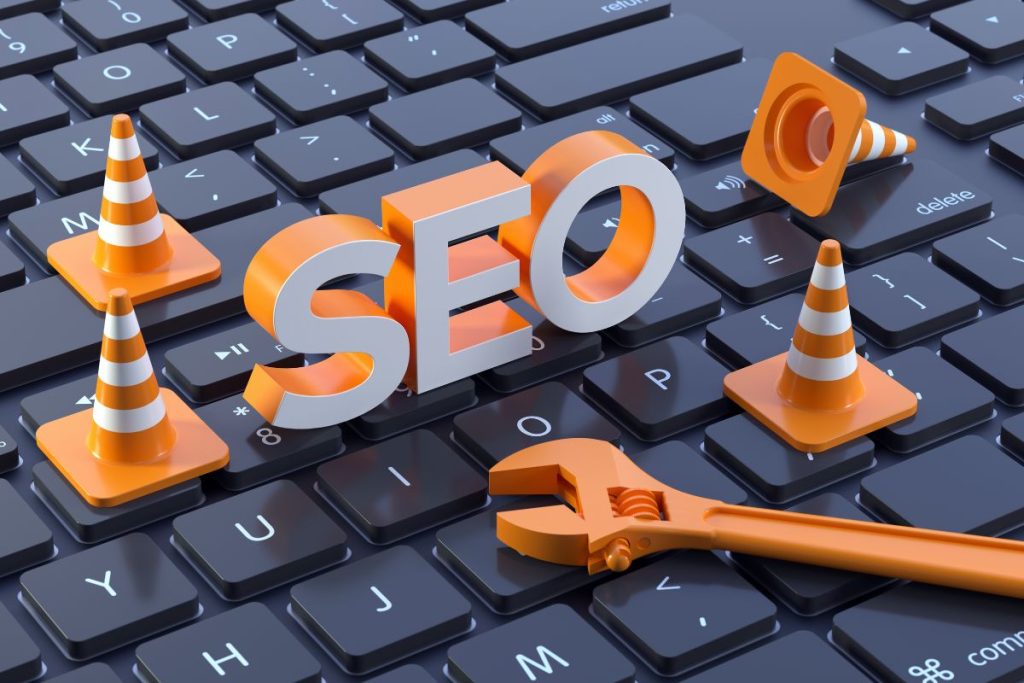Technical SEO is the unsung hero of high-performing websites, ensuring search engines can easily crawl, index, and rank your pages. While elegant design, imagery, content and backlinks often steal the spotlight, a solid technical foundation in technical SEO fundamentals is what drives long-term search success.
At Yellowball, we specialise in SEO audits and building websites that thrive in search rankings. In this comprehensive guide, we’ll cover the key aspects of technical SEO, provide actionable insights on how to do technical SEO yourself, and share best practices to help your website stand out.
Types of SEO
The first thing to understand is where your technical SEO fits into the overall SEO of your website.
On-Page SEO
On-page SEO refers to the things your readers can see or may see on your page. Your content, image alt text, meta descriptions, keywords, headers, URLs and links all form part of this.
Off-Page SEO
Off-page SEO tells search engines how valuable your content is to users by looking at things like links to your content that appear on other sites. But beware! If sites that lack credibility link back to your site, it could actually harm you. If, on the other hand, highly credible sites give you their votes of confidence, up go your search engine rankings.
Technical SEO
Search engines “crawl” sites to figure out their relevance and rank them accordingly. Technical SEO makes your site “crawlable” and that means the hard work you put into on-page SEO gets noticed. If your site isn’t crawler-friendly, it will be much harder to rise through search engine rankings, no matter how well you did everything else. That, in a nutshell, is why technical SEO is so important, and why overlooking it is a mistake.
What Is Technical SEO, and What are the Benefits?
Technical SEO refers to optimising your website’s infrastructure to ensure search engines can effectively crawl, index, and rank it. It focuses on the technical elements of your website that impact its visibility and performance. With a robust technical SEO strategy, you:
Improve Crawl Budget Efficiency
Search engines have a limited crawl budget for your site. Technical SEO ensures bots prioritise your most valuable pages, skipping unnecessary or duplicate content, for better indexing.
Enhance Site Security
Technical SEO ensures your site uses HTTPS, providing a secure browsing experience. A secure site is favoured by search engines and trusted by users, boosting rankings and engagement.
Supports Mobile-First Indexing
With Google prioritising mobile-first indexing, technical SEO ensures your site is optimised for mobile users, maintaining competitive rankings and offering a seamless user experience.
Boost Site Speed
Slow websites drive users away and hurt search rankings. Technical SEO optimises elements like image compression and code efficiency to ensure fast load times and better performance.
Facilitate Rich Search Results
Using structured data like schema markup, technical SEO enhances your site’s visibility by enabling rich snippets, which increase click-through rates and stand out in search results.
Reduce Bounce Rates
Addressing issues like slow load times, broken links, and poor mobile usability keeps visitors on your site longer, reducing bounce rates and signalling quality to search engines.
Improve Website Accessibility
Features like alt text for images, semantic HTML, and logical navigation improve accessibility for users, including those with disabilities, and contribute to a better user experience.
Prepare for Algorithm Updates
Search engines regularly update their algorithms. A strong technical SEO foundation ensures your site is agile and adaptable, reducing the risk of sudden ranking drops.
Protect Against Penalties
Technical SEO helps identify and fix issues like duplicate content, crawl errors, and improper redirects, safeguarding your site from penalties that could harm its visibility.
Increase Overall ROI for SEO
Investing in technical SEO amplifies the results of your content and link-building efforts. A technically sound website maximises the impact of other SEO strategies, improving rankings, traffic, and improving your conversion rate.
Neglecting technical SEO can undermine your content and link-building efforts, resulting in missed opportunities and poor performance.
Technical SEO Best Practices to follow
The core elements of technical SEO form the foundation for a well-optimised website, addressing critical aspects that ensure search engines can crawl, index, and rank your content effectively while enhancing user experience.
1. Website Crawling and Indexing
Search engines use bots to crawl websites and index their pages. Technical SEO ensures these bots can access and understand your content without issues.
Best Practices:
- Submit an XML Sitemap: Submit your sitemap to Google Search Console and Bing Webmaster Tools to guide search engines through your site structure.
- Optimise Robots.txt Files: Use robots.txt to block search engines from crawling unnecessary pages, such as admin areas or duplicate content.
- Fix Indexing Issues: Use Google Search Console’s Coverage Report to identify and resolve indexing errors.
2. Mobile-Friendliness
With mobile-first indexing, Google primarily evaluates the mobile version of your site to determine rankings. A responsive, mobile-friendly design is essential for any technical SEO strategy if you want to compete in today’s search landscape.
Best Practices:
- Use Responsive Design: Ensure your site adapts seamlessly to different screen sizes and devices.
- Optimise for Speed: Compress images and enable browser caching to improve mobile load times.
- Test for Mobile Friendliness: Use Google’s Mobile-Friendly Test to identify and fix issues.
3. Site Speed and Core Web Vitals
Page speed is a critical ranking factor, and Google’s Core Web Vitals metrics—Largest Contentful Paint (LCP), First Input Delay (FID), and Cumulative Layout Shift (CLS)—measure the performance of your site.
Best Practices:
- Compress Images: Use tools like ShortPixel or Smush to reduce image file sizes without losing quality.
- Minify Code: Remove unnecessary characters from CSS, JavaScript, and HTML to improve load times.
- Leverage CDNs: Content Delivery Networks ensure faster delivery of your site to global users.
- Monitor Performance: Regularly test your site using tools like Google PageSpeed Insights and GTmetrix.
4. Secure Your Site with HTTPS
Security is a top priority for search engines and users. HTTPS encrypts data, providing a secure browsing experience and signalling to Google that your site is trustworthy.
Best Practices:
- Install an SSL Certificate: Ensure all pages on your site use HTTPS and redirect HTTP versions to HTTPS.
- Check for Mixed Content: Identify and fix non-secure elements using browser developer tools or SEO crawlers.
- Renew SSL Certificates: Keep your security certifications up to date.
5. Optimise URL Structures
A clean and logical URL structure improves user experience and makes it easier for search engines to understand your content.
Best Practices:
- Use Descriptive URLs: Include target keywords naturally and avoid unnecessary parameters or special characters.
- Keep URLs Short: Shorter URLs are easier to read, share, and rank higher.
- Use Hyphens: Separate words with hyphens instead of underscores for better readability.
6. Fix Broken Links and Errors
Broken links frustrate users and harm SEO by wasting your site’s crawl budget. Regularly auditing your links prevents these issues.
Best Practices:
- Audit Links Regularly: Use tools like Screaming Frog or Ahrefs to identify broken links.
- Set Up 301 Redirects: Redirect old or deleted URLs to relevant pages.
- Monitor Crawl Errors: Use Google Search Console to find and fix crawl issues.
7. Canonicalisation and Duplicate Content
Duplicate content confuses search engines and can dilute your rankings. Canonical tags help identify the preferred version of a page.
Best Practices:
- Use Canonical Tags: Add rel=canonical tags to point duplicate content to the primary version.
- Consolidate Content: Merge similar pages or use redirects to eliminate redundancy.
- Audit for Duplicates: Use tools like SEMrush or Siteliner to find duplicate content issues.
8. Schema Markup
Schema markup provides search engines with additional information about your content, enabling rich results like review stars, product prices, and FAQs in search results.
Best Practices:
- Implement Structured Data: Add schema for products, events, FAQs, and local businesses.
- Validate with Google Tools: Use Google’s Rich Results Test to check for errors in your structured data.
- Use Plugins: Tools like Rank Math and Yoast SEO simplify schema implementation.
9. Optimise Internal Linking
Internal links guide search engines and users through your site, helping distribute link equity and improve navigation.
Best Practices:
- Link Strategically: Use relevant anchor text to connect related pages.
- Fix Broken Internal Links: Redirect or update links that point to non-existent pages.
- Add Breadcrumbs: Breadcrumb navigation improves usability and provides additional internal links for search engines.
10. Regularly Audit Your Site
SEO is an ongoing process, and regular technical SEO audits help identify and fix issues before they affect performance.
Best Practices:
- Use SEO Tools: Tools like Ahrefs, SEMrush, and Screaming Frog make auditing efficient.
- Check Key Metrics: Monitor crawlability, load times, and indexing status.
- Stay Updated: Adapt your site to changes in Google’s algorithm and SEO trends.
Technical SEO Strategy FAQs
Technical SEO focuses on the backend aspects of your website, ensuring search engines can crawl, index, and rank your site efficiently. It includes elements like site speed, mobile-friendliness, and URL structure. On-page SEO, on the other hand, deals with optimising the visible content and metadata to improve rankings. Together, they form a complete SEO strategy.
Performing a technical SEO audit every quarter is ideal to keep your website in top shape. Regular audits help identify crawl errors, broken links, and performance issues that may hinder your site’s visibility. Additionally, conducting an audit after significant site changes or updates ensures everything is optimised for search engines. Regular content audits should also form part of your SEO plan, find out more in our guide to how to conduct a content audit.
HTTPS is vital for website security as it encrypts data exchanged between your site and its users, protecting sensitive information. Google prioritises secure sites, making HTTPS a key ranking factor. Beyond SEO, HTTPS builds trust with users, encouraging them to stay on your site longer. Transitioning to HTTPS involves installing an SSL certificate and addressing technical details like mixed content issues.
Core Web Vitals are Google’s performance metrics that measure page speed, interactivity, and visual stability. These include Largest Contentful Paint (LCP), First Input Delay (FID), and Cumulative Layout Shift (CLS). They play a crucial role in determining your site’s user experience and search rankings. Sites that meet Core Web Vitals benchmarks are more likely to rank higher and retain users.
Yes, a strong technical SEO strategy significantly boosts rankings by optimising your site for search engine crawling, indexing, and performance. It addresses crucial factors like site speed, mobile-friendliness, and structured data, ensuring your site meets Google’s requirements. A well-optimised site not only ranks higher but also provides a better user experience and customer experience, which can lead to increased engagement and conversions.
Power Up Your Rankings with Expert Technical SEO
Technical SEO is the foundation of a successful website. It ensures search engines can access, understand, and rank your content while providing users with a seamless experience. By addressing crawling, speed, mobile-friendliness, and site security, you can position your site for long-term success.
With expertise in web design, development, and SEO, Yellowball is your trusted partner for professional SEO audits and pushing technical SEO fundamentals into website performance excellence. Ready to turn your website into a performance powerhouse? Contact Yellowball today to unlock your site’s full potential with our bespoke technical SEO services and web development solutions.
Read more: The importance of SEO in web design processes in our SEO guides.









